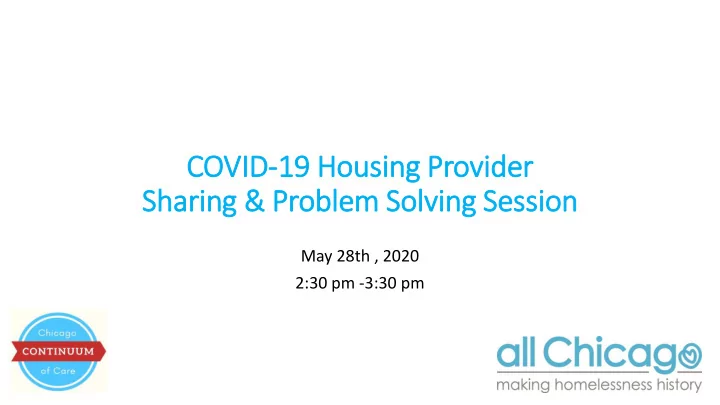

COV OVID-19 H Housing P g Provider er Sharing & g & Problem em S Solving g Ses ession May 28th , 2020 2:30 pm -3:30 pm
Goals Dedicated time for housing providers Sharing questions, strategies, resources Working toward solutions and common understanding
Today’s Topics Lesson Learned Wrap-up and COVID-19 and Next Topic(s) Training Series
Presenters Avi Rudnick- Chicago House Laura Bass- Facing Forward to End Homelessness
Identifyi ying C g Clien ent N Need eeds Tips from Brant Hewelt, Gaining Ground Program Manager: During this time, it is more important that we have a clear idea of clients’ access to food, medicine, • and basic needs. We have less capacity to resolve immediate needs so it is even more important that we stay ahead of it. So each check in, I really try to get a sense of peoples’ access to food, meds, and basic needs • without it sounding like an assessment or an interrogation. I find questions like, “How are you doing with food/medications/household items?” Or “Do you have enough • food/medications/household items? to be a little too broad to be helpful . I find framing things in terms of time to be much clearer in assessing peoples’ access. • In conversation that may look something like, “When do you think you’ll need to go to the grocery • store/food pantry next?” Or “How long will your current medication supply last you?” • By framing things in terms of time, I find it easier to plan with clients around addressing scarcity. •
Res esources es to S Support E t Engagem emen ent Groceries and Cleaning Supplies • Non-Contact Drop Offs • Also increases engagement Ride Shares • Reduces exposure to public transit • Also increases engagement
Crisi sis R s Res espo ponse se • How to Ensure Staff Safety? • How to Engage with Clients? • These are all things we are learning how to do as we go. • Many of the strategies we have used in the past are no longer accessible given physical distancing.
Ha Harm R Reduction S Strategi egies es Substance Use: Supporting clients experiencing relapse Supporting clients experiencing heavy or chaotic use Assisting individuals who are not adhering to social distancing, wearing masks, etc. Mental Health: Supporting medication adherence Supporting engagement with service providers Assisting individuals who are not adhering to social distancing, wearing masks, etc. Supporting clients with a dual diagnosis, where both mental health and substance use are creating barriers Sex Work: Working with regulars Avoid kissing Implementing hygiene practices before and after engaging with a client
Supporti ting S Staff f • Making sure staff have the necessary tools • Weekly Check-Ins Virtual Meetings Supervisions Sub-team Meetings Monthly Team Meetings Trauma-Informed Supervision How are staff coping? How is this impacting their work? How creative and flexible can we be?
Admin inis istrativ ive I Implic licatio ions and Q Quality A Assurance e Redesigning service delivery • Writing new policies and procedures • Navigating new funding streams • Identifying and applying for new funding • Meeting funder requirements • Collecting Data • Maintaining documentation •
Foundation onal al Trai aining S Series es Aimed at staff without much previous homeless services experience Goals: To prepare staff for direct service roles • Cover key topics that are common to all settings • Reduce the time needed for agencies to onboard new staff • Survey of providers: most felt training series would be helpful •
Sugges ested ed T Topics – Mos ost P Pop opular ar Harm Reduction • Motivational Interviewing • Trauma-Informed Care • Engagement Skills, Rapport Building • Person-Centered Services • Service Planning, Goal Setting • Documentation and Data •
Sugges ested ed T Topics Assessment Homeless Service System, CES, Housing Models Cultural Humility Crisis Management, Safety Planning Confidentiality Case Management, Advocacy 101 Boundaries Staff Self Care, Stress Management Public Benefits, Community Resources
Trainin ing L Log ogistics Hours of training – respondents suggest 4 – 40 hours • Average suggested # of hours: 15 • Several suggested that training session be held on non-consecutive • days to allow for integration of learning For example, one day or half day for 4 weeks Keep sessions short – 90 minutes to 2 hours • Use pre- and post-test •
Additio ional Q l Questio ions Should training be offered as a package, or menu? • How often should series be offered? • Interest in developing and delivering training • Can you put your comments, ideas and thoughts in the question pane? If you are interested in joining an upcoming Conference Call to identify next steps, please email: Twinbush@allchicago by Monday, June 1st
Future Top opics & cs & Next Se Sessi ssion
Fu Future Topics & Next t Session Future Topics Next Session 1. Disability Documentation Technical Thursday, June 4th Assistance- Jennifer Fabbrini and 2:30 pm – 3:30 pm Elizabeth Perez (All Chicago) Same Link as This Week? 2. ??? (Put it in the chat ) 3. Email (twinbush@allchicago.org) Would you like to help plan or facilitate a future session? Contact Torelen (twinbush@allchicago.org)
Recommend
More recommend